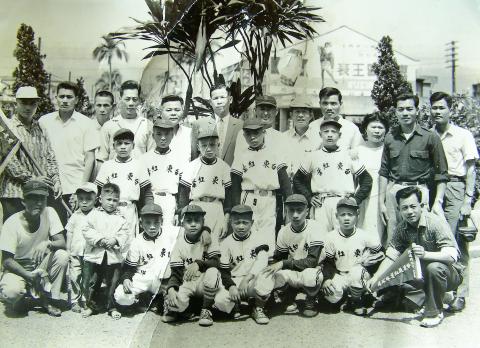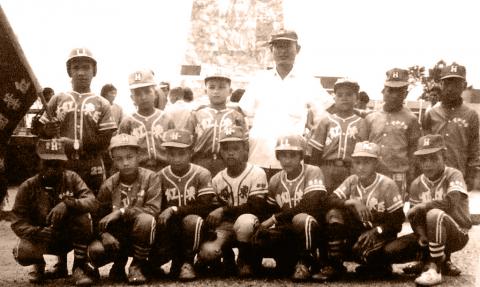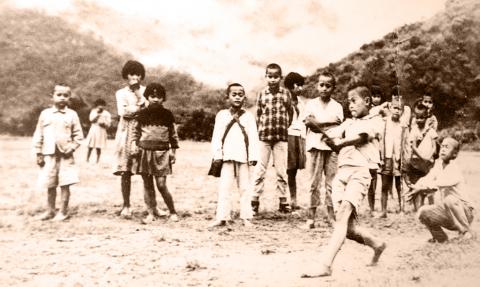Aug. 21 to Aug. 27
Chiu Sheng-teh (邱聖德) recalls protesting in anger when he heard a sports commentator say that the accomplishments in the 1960s of the Hongye Junior Baseball Team (紅葉少棒), made up of members from the Bunan Aboriginal people, were just an exaggerated legend that was sensationalized by the media and should not be celebrated.
Chiu’s father was a member of the 1968 team, which pretty much ignited Taiwan’s baseball craze, serving as a prelude to the glorious 1970s when Taiwanese teams dominated the international circuit.

Photo: Yang I-min, Taipei Times
But despite the team’s inspirational rags-to-success story, it seemed to always have its skeptics — and its fair share of controversy. In response, Chiu later published the study The Summer of 1968: A Study on Hongye’s Life History (1968年的夏天 - 紅葉少棒隊生命史的研究).
BASEBALL LEGEND
Let’s look at the legend first. It almost didn’t happen for the Hongye little league baseball team. Despite claiming first place at the Chiumao Cup (秋茂杯) in Tainan in March 1968, the team announced that it would not be able to make it to the National Youth Tournament in Taipei the following month because it lacked funding.

Photo: Chang Chun-wei, Taipei Times
Situated in an impoverished Aboriginal village in Taitung County, it is said that the team would often have to practice with “sticks as bats and stones as balls.” According to a news report from May 1968, the school only had 114 students and five staff, including the principal. Luckily, Hongye’s plight was widely reported in the media, and the donations poured in, enabling the team to participate. It eventually captured the championship by defeating a team from Chiayi 2-1.
The story does not stop here, as Hongye’s success earned it a match with a visiting Japanese all-star team. Up to this point, no Taiwanese youth team had defeated a youth team from Japan. On Aug. 25, however, after seven innings, Hongye emerged the winner with a 7-0 finish, and reportedly did not even allow a Japanese player past first base. Victory was sealed when Hongye scored two home runs in a row in the sixth inning. News reports show that bills of NT$10, NT$50 and NT$100 rained down from the crowd of 20,000 despite attempts by officials to stop the behavior.
Two days later, then-defense minister Chiang Ching-kuo (蔣經國) personally congratulated the team and promised that he would visit their village. In addition, the Ministry of Education announced that it would give the school NT$10,000 for sports equipment. The era of Taiwanese dominance of the diamond had just begun, which was a boost for the nation at a time when it was losing its international standing.

Photo: Wang Ing-ming, Taipei Times
Why would such a beautiful story have so many doubters?
THE DOUBTERS
First of all, there was the scandal that the team used older players from outside the school who competed under false names. As early as June 18, 1968, the United Daily News ran an article stating that 23 fans had reported the behavior to the Ministry of Education and the National Baseball Association.
Hongye denied the claims, and the association concluded that there was not enough evidence, and allowed the team to continue competing, adding that it had “strict” screening methods. Hongye principle Hu Hsueh-li (胡學禮) stated in a news conference that the accusations were made by jealous opponents.
Not much news was made of it over the following months, but on April 26,1969, coach Hu and the team’s manager were convicted and sentenced by the Taitung District Court for forgery of public documents. The United Daily News report said that they had falsified the ages of five players and also used players from outside the school who played under the names of several current players.
The final bit of controversy is that for whatever reason, the popular version of events became that Hongye beat the Japanese little league world champion Wakayama on that day. This version is perpetuated even to recent times, as the school celebrated the 40th anniversary of its victory against “Wakayama” in 2008.
Chiang Chieh-long (江杰龍) shows in the study The Rise of the Hongye Little League Baseball Team (台東紅葉少棒隊的崛起) that there was mass confusion in the media as to whom exactly Hongye would be playing, with each article stating something different or being ambiguous. In the end, the Wakayama version stuck.
Chiang’s argument, however, is that it could not have been the Wakayama team because they were competing in the Little League World Series in the US, which didn’t conclude until Aug. 24. The question is, was this confusion intentional to boost the team’s legend, or was it just sloppy reporting?

As Taiwan’s second most populous city, Taichung looms large in the electoral map. Taiwanese political commentators describe it — along with neighboring Changhua County — as Taiwan’s “swing states” (搖擺州), which is a curious direct borrowing from American election terminology. In the early post-Martial Law era, Taichung was referred to as a “desert of democracy” because while the Democratic Progressive Party (DPP) was winning elections in the north and south, Taichung remained staunchly loyal to the Chinese Nationalist Party (KMT). That changed over time, but in both Changhua and Taichung, the DPP still suffers from a “one-term curse,” with the

William Liu (劉家君) moved to Kaohsiung from Nantou to live with his boyfriend Reg Hong (洪嘉佑). “In Nantou, people do not support gay rights at all and never even talk about it. Living here made me optimistic and made me realize how much I can express myself,” Liu tells the Taipei Times. Hong and his friend Cony Hsieh (謝昀希) are both active in several LGBT groups and organizations in Kaohsiung. They were among the people behind the city’s 16th Pride event in November last year, which gathered over 35,000 people. Along with others, they clearly see Kaohsiung as the nexus of LGBT rights.

Jan. 26 to Feb. 1 Nearly 90 years after it was last recorded, the Basay language was taught in a classroom for the first time in September last year. Over the following three months, students learned its sounds along with the customs and folktales of the Ketagalan people, who once spoke it across northern Taiwan. Although each Ketagalan settlement had its own language, Basay functioned as a common trade language. By the late 19th century, it had largely fallen out of daily use as speakers shifted to Hoklo (commonly known as Taiwanese), surviving only in fragments remembered by the elderly. In

In the American west, “it is said, water flows upwards towards money,” wrote Marc Reisner in one of the most compelling books on public policy ever written, Cadillac Desert. As Americans failed to overcome the West’s water scarcity with hard work and private capital, the Federal government came to the rescue. As Reisner describes: “the American West quietly became the first and most durable example of the modern welfare state.” In Taiwan, the money toward which water flows upwards is the high tech industry, particularly the chip powerhouse Taiwan Semiconductor Manufacturing Co (TSMC, 台積電). Typically articles on TSMC’s water demand